 An American B-17 Flying Fortress takes off from an Allied airstrip in Europe, patrolling the skies during World War II. It’s the last flight for her Captain and crew, who have flown 23 successful sorties over Europe; after their 24th, most of them are going home. But a mid-air dogfight puts their future plans in doubt. The Nazi plane is shot down, but not before its debris slams into the American plane, trapping Jonathan, a young dreamer who hopes to return to the States and become a cartoonist for Disney, in the belly gunner position. Worse yet, the attack destroyed the plane’s landing gear. The Captain is capable of landing the plane on its belly, but Jonathan will almost certainly be killed. His comrades in arms pray, argue about whether to end his suffering early, and bid their farewells as the plane prepares for its fateful landing…but ultimately, Jonathan is left to draw his own conclusions as to how that landing will unfold.
An American B-17 Flying Fortress takes off from an Allied airstrip in Europe, patrolling the skies during World War II. It’s the last flight for her Captain and crew, who have flown 23 successful sorties over Europe; after their 24th, most of them are going home. But a mid-air dogfight puts their future plans in doubt. The Nazi plane is shot down, but not before its debris slams into the American plane, trapping Jonathan, a young dreamer who hopes to return to the States and become a cartoonist for Disney, in the belly gunner position. Worse yet, the attack destroyed the plane’s landing gear. The Captain is capable of landing the plane on its belly, but Jonathan will almost certainly be killed. His comrades in arms pray, argue about whether to end his suffering early, and bid their farewells as the plane prepares for its fateful landing…but ultimately, Jonathan is left to draw his own conclusions as to how that landing will unfold.
 teleplay by Menno Meyjes
teleplay by Menno Meyjes
story by Steven Spielberg
directed by Steven Spielberg
music by John Williams
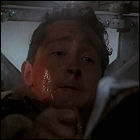 Cast: Kevin Costner (Captain Spark), Casey Siemaszko (Jonathan), Kiefer Sutherland (Static), Jeffrey Jay Cohen (Jake), John Philbin (Bullseye), Gary Mauro (Sam), Glen Mauro (Dave), Terry Beaver (Officer), David Grant Hayward (Mechanic #1), Peter Jason (Commander), Karen Hopkins (Liz), Anthony Lapaglia (Mechanic #2), Gary Riley (Tail Gunner), Ken Stovitz (Lamar), Nelson Welch (Father McKay)
Cast: Kevin Costner (Captain Spark), Casey Siemaszko (Jonathan), Kiefer Sutherland (Static), Jeffrey Jay Cohen (Jake), John Philbin (Bullseye), Gary Mauro (Sam), Glen Mauro (Dave), Terry Beaver (Officer), David Grant Hayward (Mechanic #1), Peter Jason (Commander), Karen Hopkins (Liz), Anthony Lapaglia (Mechanic #2), Gary Riley (Tail Gunner), Ken Stovitz (Lamar), Nelson Welch (Father McKay)
Notes: Though the typical format of an Amazing Stories episode was a half-hour timeslot, NBC and showrunner Steven Spielberg agreed that he would direct at least one episode with an extended running time. Kevin Costner, Kiefer Sutherland and Jonathan Lapaglia all went on to greater fame after this episode. 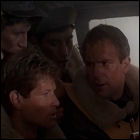 Casey Siemaszko had already been seen on the big screen (as Biff’s 3-D-glasses-wearing cohort in Back To The Future), and went on to recurring roles in NYPD Blue and Damages. Perhaps even more surprising than Steven Spielberg directing an hour of television at the height of his fame was that he got composer John Williams, one of his most frequent collaborators throughout his career, to score an hour of television. (Williams had already done the series’ theme music.) One of the orchestrators helping Williams arrange the score for this episode was Alexander Courage, better known for writing the theme tune from Star Trek. Spielberg was nominated for best director in the 1986 Emmy Awards for this episode, but lost to Georg Stanford Brown, director of the last episode of Cagney & Lacey’s fifth season. This episode’s cinematographer, John McPherson, did win an Emmy for the show’s lighting and camera work.
Casey Siemaszko had already been seen on the big screen (as Biff’s 3-D-glasses-wearing cohort in Back To The Future), and went on to recurring roles in NYPD Blue and Damages. Perhaps even more surprising than Steven Spielberg directing an hour of television at the height of his fame was that he got composer John Williams, one of his most frequent collaborators throughout his career, to score an hour of television. (Williams had already done the series’ theme music.) One of the orchestrators helping Williams arrange the score for this episode was Alexander Courage, better known for writing the theme tune from Star Trek. Spielberg was nominated for best director in the 1986 Emmy Awards for this episode, but lost to Georg Stanford Brown, director of the last episode of Cagney & Lacey’s fifth season. This episode’s cinematographer, John McPherson, did win an Emmy for the show’s lighting and camera work.
LogBook entry by Earl Green
 The Globe family has moved from Chicago to the family’s original farmland, a move that doesn’t excite young Brian, who has only known city life. The one bright side of the move is that Brian’s grandfather, Ompa, is moving in with them. But he too is less than thrilled about his new surroundings: on the farmland are reminders of a railroad line that once ran through here, where a train derailed because of his foolishness as a young boy. Ompa insists that the same train will be coming for him soon – and warns that the house is in its way.
The Globe family has moved from Chicago to the family’s original farmland, a move that doesn’t excite young Brian, who has only known city life. The one bright side of the move is that Brian’s grandfather, Ompa, is moving in with them. But he too is less than thrilled about his new surroundings: on the farmland are reminders of a railroad line that once ran through here, where a train derailed because of his foolishness as a young boy. Ompa insists that the same train will be coming for him soon – and warns that the house is in its way.teleplay by Frank Deese
Cast: Roberts Blossom (Ompa), Scott Paulin (Fenton), Gail Edwards (Jolene), Lukas Haas (Brian Globe), Renny Roker (Dr. Steele), Hugh Gillin (Conductor), Sandy Ward (Engineer)

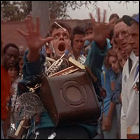 Cast: John Scott Clough (Brad Bender), Lisa Jane Persky (Shirley), Richard Bull (Mr. Hiller), Barbara Sharma (Mrs. Bender), Tom Napier (wylie), Bill Allen (Cliff Rath), Nicholas Mele (Scientist #1), Joan Foley (Scientist #2), Brad Bird (Scientist #3), Dominick Brascia (Billy Johnson – Fat Kid), Isabelle Walker (Francine), Eric Bruskotter (Stan), Michael Joshua Cramer (Kid), Megan Wyss (Girl #1 Blonde), Piper cochrane (Girl #2 Darcy Cook), Larry Spinak (Geek)
Cast: John Scott Clough (Brad Bender), Lisa Jane Persky (Shirley), Richard Bull (Mr. Hiller), Barbara Sharma (Mrs. Bender), Tom Napier (wylie), Bill Allen (Cliff Rath), Nicholas Mele (Scientist #1), Joan Foley (Scientist #2), Brad Bird (Scientist #3), Dominick Brascia (Billy Johnson – Fat Kid), Isabelle Walker (Francine), Eric Bruskotter (Stan), Michael Joshua Cramer (Kid), Megan Wyss (Girl #1 Blonde), Piper cochrane (Girl #2 Darcy Cook), Larry Spinak (Geek)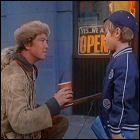 Cast: Kelly Reno (Jobe), William Boyett (Colonel Travis), Lurene Tuttle (Harriet Wendse), Richard Young (Davy Crockett), Robert V. Barron (Curator), Michael Cavanaugh (Storekeeper), Benjie Gregory (Sam), Dick Yarmy (VCR / Man #2), Pattie Pierce (Tour Guide), Chip Lucia (Dad)
Cast: Kelly Reno (Jobe), William Boyett (Colonel Travis), Lurene Tuttle (Harriet Wendse), Richard Young (Davy Crockett), Robert V. Barron (Curator), Michael Cavanaugh (Storekeeper), Benjie Gregory (Sam), Dick Yarmy (VCR / Man #2), Pattie Pierce (Tour Guide), Chip Lucia (Dad)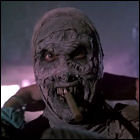 Cast: Tom Harrison (Harold), Bronson Pinchot (Dean), Brion James (Willie Joe), Tracey Walter (Ezra), Larry Hankin (Jubal), Lucy Lee Flippin (Librarian), William Frankfather (Mayor), Arnold Johnson (Town Sage), Michael Zand (Ra Amin Ka), Len Lesser (Old Grave Robber), Billy Beck (Old Blind Man), Brian Bradley (Actor), Joann Willette (Ruta Mae), Pamela Seamon (Assistant Director), Edlen Ratliff (Freckle-Faced Boy), Dalton Cathey (Doctor), Oliver Dear (Young Grave Robber), Susan Dear (Harold’s Wife), Bill Martin (Guard)
Cast: Tom Harrison (Harold), Bronson Pinchot (Dean), Brion James (Willie Joe), Tracey Walter (Ezra), Larry Hankin (Jubal), Lucy Lee Flippin (Librarian), William Frankfather (Mayor), Arnold Johnson (Town Sage), Michael Zand (Ra Amin Ka), Len Lesser (Old Grave Robber), Billy Beck (Old Blind Man), Brian Bradley (Actor), Joann Willette (Ruta Mae), Pamela Seamon (Assistant Director), Edlen Ratliff (Freckle-Faced Boy), Dalton Cathey (Doctor), Oliver Dear (Young Grave Robber), Susan Dear (Harold’s Wife), Bill Martin (Guard) Cast: Kevin Costner (Captain Spark), Casey Siemaszko (Jonathan), Kiefer Sutherland (Static), Jeffrey Jay Cohen (Jake), John Philbin (Bullseye), Gary Mauro (Sam), Glen Mauro (Dave), Terry Beaver (Officer), David Grant Hayward (Mechanic #1), Peter Jason (Commander), Karen Hopkins (Liz), Anthony Lapaglia (Mechanic #2), Gary Riley (Tail Gunner), Ken Stovitz (Lamar), Nelson Welch (Father McKay)
Cast: Kevin Costner (Captain Spark), Casey Siemaszko (Jonathan), Kiefer Sutherland (Static), Jeffrey Jay Cohen (Jake), John Philbin (Bullseye), Gary Mauro (Sam), Glen Mauro (Dave), Terry Beaver (Officer), David Grant Hayward (Mechanic #1), Peter Jason (Commander), Karen Hopkins (Liz), Anthony Lapaglia (Mechanic #2), Gary Riley (Tail Gunner), Ken Stovitz (Lamar), Nelson Welch (Father McKay) Casey Siemaszko had already been seen on the big screen (as Biff’s 3-D-glasses-wearing cohort in Back To The Future), and went on to recurring roles in NYPD Blue and Damages. Perhaps even more surprising than Steven Spielberg directing an hour of television at the height of his fame was that he got composer John Williams, one of his most frequent collaborators throughout his career, to score an hour of television. (Williams had already done the series’ theme music.) One of the orchestrators helping Williams arrange the score for this episode was Alexander Courage, better known for writing the theme tune from Star Trek. Spielberg was nominated for best director in the 1986 Emmy Awards for this episode, but lost to Georg Stanford Brown, director of the last episode of Cagney & Lacey’s fifth season. This episode’s cinematographer, John McPherson, did win an Emmy for the show’s lighting and camera work.
Casey Siemaszko had already been seen on the big screen (as Biff’s 3-D-glasses-wearing cohort in Back To The Future), and went on to recurring roles in NYPD Blue and Damages. Perhaps even more surprising than Steven Spielberg directing an hour of television at the height of his fame was that he got composer John Williams, one of his most frequent collaborators throughout his career, to score an hour of television. (Williams had already done the series’ theme music.) One of the orchestrators helping Williams arrange the score for this episode was Alexander Courage, better known for writing the theme tune from Star Trek. Spielberg was nominated for best director in the 1986 Emmy Awards for this episode, but lost to Georg Stanford Brown, director of the last episode of Cagney & Lacey’s fifth season. This episode’s cinematographer, John McPherson, did win an Emmy for the show’s lighting and camera work.